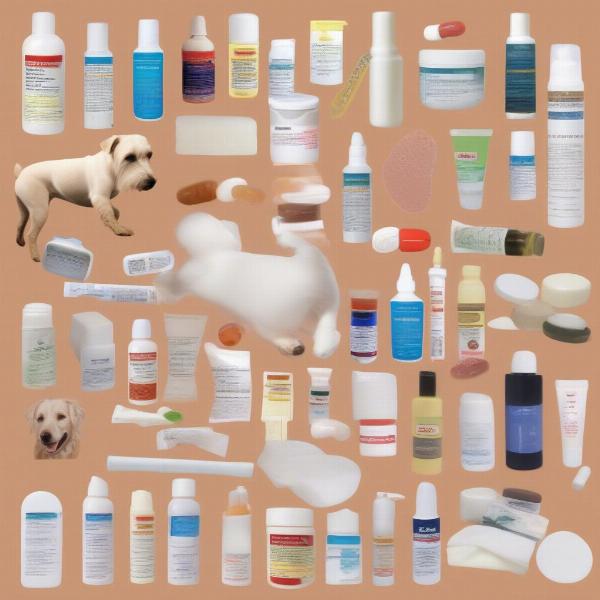Itchy skin is a common problem in dogs, and finding the right medication can significantly improve their quality of life. This article will explore the various medications available for itchy skin on dogs, covering everything from common causes and diagnoses to treatment options and preventative measures. Understanding the underlying cause of your dog’s itch is crucial for effective treatment.
Common Causes of Itchy Skin in Dogs
Several factors can contribute to itchy skin in dogs. Allergies, whether environmental, food-related, or flea-based, are often the culprit. Parasites like mites and ticks can also cause intense itching. Bacterial and fungal infections are another possibility, as are hormonal imbalances and certain medical conditions.
Diagnosing the Itch: A Vet’s Perspective
A proper diagnosis is essential before starting any medication. Your veterinarian will likely conduct a physical examination, review your dog’s medical history, and may perform tests such as skin scrapings, blood tests, or allergy testing. These tests help determine the underlying cause of the itching and guide treatment decisions.
Medication Options for Itchy Skin
Various medications can alleviate itching in dogs, depending on the cause. Antihistamines can help manage allergic reactions, while corticosteroids reduce inflammation. For parasitic infestations, specific medications target mites, fleas, and ticks. Antifungal and antibacterial medications are prescribed for infections. In some cases, immunomodulatory drugs might be necessary to manage chronic skin conditions.
 Medication for itchy dogs
Medication for itchy dogs
Antihistamines for Dogs
Antihistamines like diphenhydramine (Benadryl) can provide relief from allergy-related itching. Always consult your veterinarian before giving your dog any over-the-counter medication, as dosages vary based on weight and breed.
Corticosteroids for Itchy Skin
Corticosteroids, like prednisone, are powerful anti-inflammatory drugs that can significantly reduce itching. However, they can have side effects with long-term use, so they are typically prescribed for short-term relief or in severe cases.
Medicated Shampoos and Topical Treatments
Medicated shampoos containing ingredients like ketoconazole or chlorhexidine can help manage fungal and bacterial infections, providing soothing relief. Topical creams and ointments can also be effective for localized itching. ketoconazole for dogs shampoo is a popular choice for fungal infections.
Home Remedies and Preventative Measures
In addition to medication, several home remedies and preventative measures can help manage your dog’s itchy skin. Regular bathing with a hypoallergenic shampoo can remove allergens and soothe irritated skin. Adding omega-3 fatty acids to your dog’s diet can improve skin and coat health. How to help a dog with dry skin offers more insights on managing skin issues. You can also try a yeast spray for dogs if yeast is a suspected issue.
Are there natural remedies for itchy skin on dogs?
Yes, some natural remedies, such as oatmeal baths and coconut oil, can provide temporary relief.
How can I prevent my dog’s skin from itching?
Regular grooming, a balanced diet, and parasite prevention can help minimize itching. Are beagle dogs hypoallergenic explores breeds less prone to allergies. Consider best dog food for dogs with digestive problems if food allergies are a concern.
Conclusion
Medication for itchy skin on dogs requires a careful diagnosis and tailored treatment plan. By working closely with your veterinarian and implementing preventative measures, you can help your dog find relief from itching and enjoy a healthier, happier life.
1. What is the most common cause of itchy skin in dogs?
Allergies are the most common cause, followed by parasites.
2. Can I give my dog human antihistamines?
Only under the guidance of your veterinarian, as dosages differ from human recommendations.
3. Are there long-term solutions for itchy skin?
Managing underlying conditions and implementing preventative measures are crucial for long-term relief.
4. When should I take my dog to the vet for itching?
If the itching is severe, persistent, or accompanied by other symptoms, consult your veterinarian immediately.
5. What are some signs of a skin infection in dogs?
Redness, swelling, pus, hair loss, and a foul odor can indicate a skin infection.
ILM Dog is a leading online resource for dog owners worldwide, offering expert advice on dog breeds, health, training, nutrition, grooming, and much more. We are committed to providing practical, trustworthy information to help you provide the best possible care for your canine companion. For further assistance, reach out to our team of experts via email at [email protected] or call us at +44 20-3965-8624. ILM Dog is here to support you every step of the way.